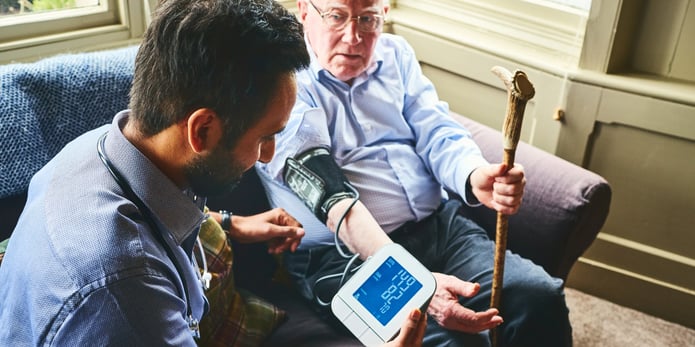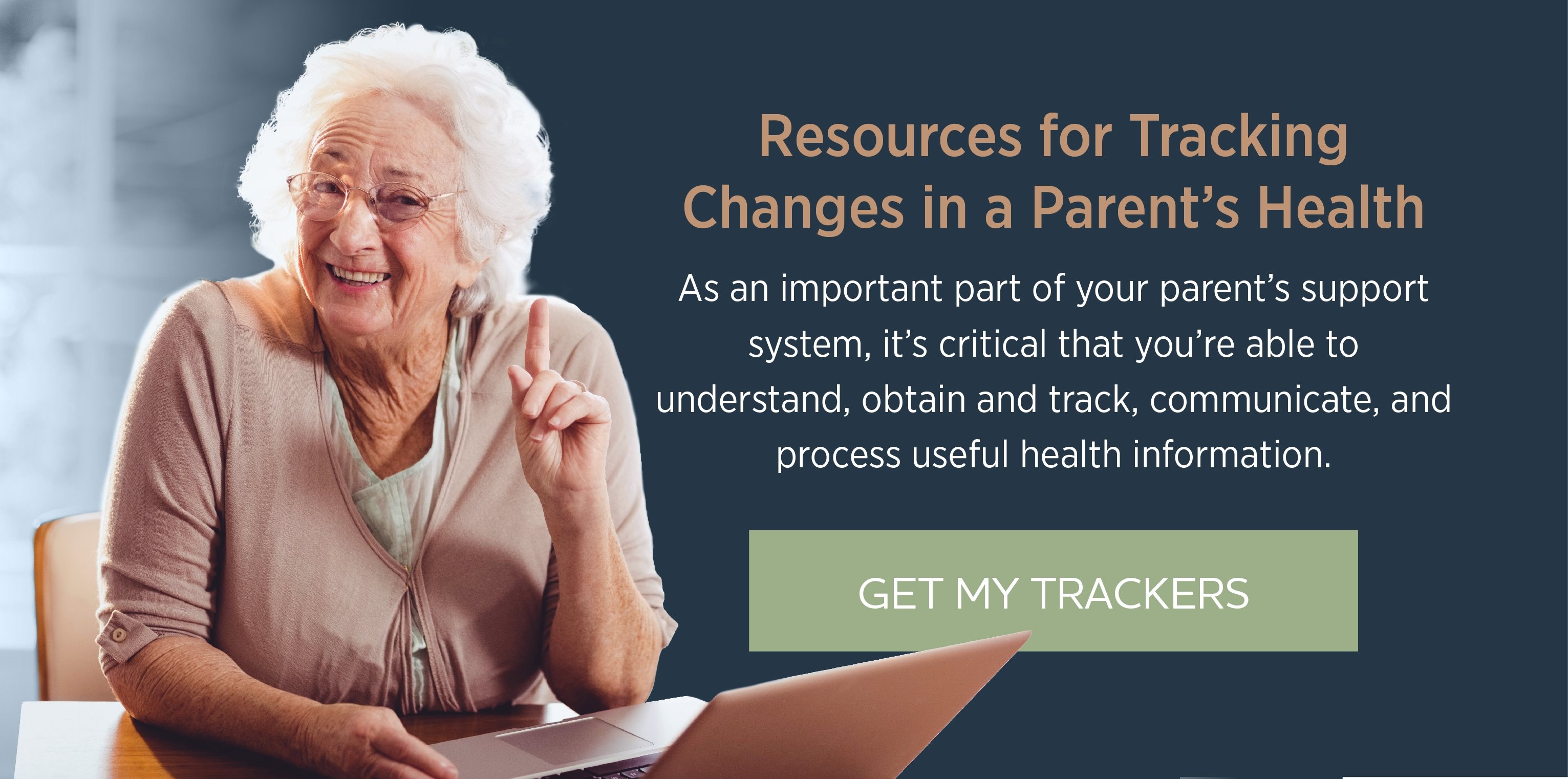
Whether you play an active role in caregiving for a parent or are just curious to know what kinds of health information you should keep track of because you accompany your parent to doctor appointments, this set of health information trackers can help.
Without a medical background, it can be difficult to pinpoint if a medication change is positively benefiting a parent or if your parent has been experiencing difficulty sleeping recently.
Consider this example: Mary’s 91-year-old father had a mini stroke a few months ago, so his doctor prescribed medication to keep his blood pressure low. But recently, he’s been feeling more fatigued and is more wobbly at home than normal. Today, Mary noticed that he seems different than usual. Perhaps even a little confused. So she calls a nurse advice line.
To help determine if there was a serious issue at hand, the nurse inquired about Mary’s father’s current blood pressure and pulse and if it had been changing over the past few weeks and months. Mary had no idea.
The Importance of Monitoring Health for Seniors
Regular doctor appointments and medical checkups are extremely important for older adults, many of whom are managing multiple chronic illnesses and the medications and treatments that accompany them. But what if there’s a problem that you don’t know how to detect in between doctor’s visits?
Keeping track of things like blood pressure, blood sugar levels, and any other changes in appetite, weight, sleep, or energy levels in between doctor visits can be incredibly helpful. Monitoring health at home can:
- Help your loved one’s doctor diagnose conditions sooner
- Eliminate false readings due to anxiety when at a doctor’s office
- Provide healthcare providers with an accurate and full picture of your loved one’s health and well-being
- Motivate your loved one to keep working on things to improve their health, such as added physical activity
- Help you and your loved one see if daily activities, diet, and medications are working
- Potentially decrease the number of visits to a doctor’s office
Of course, it’s not necessarily helpful to check every single possible measure of health every day no matter what. But by proactively tracking these seven health measures, you can get a better picture of when to see the doctor sooner and proactively take preventative measures to optimize your loved one’s health and keep it from getting any worse.
1. Changes in Health
Your parent’s doctor will want to know about any changes in their life since their last appointment. Do they have any new bone or joint pain? Have they lost their appetite most days? Are they feeling lonely or isolated?
Keeping track of how your loved one feels physically, emotionally, and mentally will help their doctor to understand your loved one’s medical conditions fully and recommend the best treatment choices. If you or your loved one notices a change in health; diet, medication, or lifestyle; thoughts and feelings; or everyday living, jot down the date and any specific notes.
2. Symptoms
You can help your parent’s doctor diagnose and treat their condition by being prepared to answer questions about their symptoms. Because some symptoms are difficult to describe, it is helpful to write down information about the symptoms as your loved one experiences them during their daily activities.
Some important things to track include:
- The time of day the symptom starts
- When the symptoms are the worst
- If the symptoms come and go during the day
- If the symptom is affected by activity, rest, stress, eating, medications, etc.
3. Weight
A change in weight can indicate trouble. Weight loss — which can be due to many reasons, including loss of appetite from medication side effects, lack of motivation to cook or clean, or trouble getting to the grocery store or remembering how to cook — can be dangerous because the body loses not just fat but also muscle. Muscle loss is a normal process of aging, but this accelerated muscle loss puts older adults at increased risk of falling and impairs their ability to live independently.
Weight gain, on the other hand, can lead to increased blood pressure, high blood sugar, and abnormal cholesterol or triglyceride levels — which increase the risk of heart disease, stroke, and Type 2 diabetes.
If your loved one is losing or gaining weight without trying and you’re concerned about it, track your loved one’s weight over time.
4. Physical Activity
Exercise and physical activity can help older adults stay healthy and independent for longer. Not only can it improve your loved one’s strength, balance, flexibility, and endurance, making it easier to navigate daily life, but staying active can also reduce their risk of developing health conditions.
If your loved one struggles to stay active, encourage them to talk with their doctor about setting physical activity goals that meet their abilities. And then remind them that it’s OK to start low and go slow. They can increase the amount of physical activity gradually over a period of weeks to months. Keep track not only of long walks or workouts but also of any time they do something extra, such as taking the stairs or parking at the far end of the lot at the store.
Tracking their physical activity might help give them a stronger sense of responsibility for their health. By monitoring, and hopefully seeing improvements in their measurements, they may feel even more motivated to stay active.
5. Blood Pressure
Blood pressure typically increases with age, but high blood pressure, also known as hypertension, is often a precursor to serious health issues, including stroke, heart attack, heart failure, and more. High blood pressure is now generally defined as 130 or higher for the first number or 80 or higher for the second number.
If your loved one has hypertension or is at risk of hypertension, checking their blood pressure at home can help you and their doctor make decisions about treatment, such as adjusting dosage, changing medication, or increasing or decreasing activity levels. In addition to tracking their blood pressure, track their daily heart rate as well as systolic and diastolic numbers.
6. Blood Sugar
If your loved one has diabetes, talk with their healthcare provider about how often they need to test their blood sugar levels. The doctor will likely want you to record their blood sugar levels, time of day, and the injection site. If they are managing their diabetes without taking insulin, they might not need to check their glucose as often.
7. Sleep
Many older adults get much less sleep than they need, and an ongoing lack of sleep or poor-quality sleep increases the risk of health problems. For example, if your loved one is sleepy, they are more likely to fall.
Tracking their sleep habits can help you see what gets in the way of a good night’s sleep and help the doctor know more about what affects your loved one’s sleep. Some important things to track include:
- What time they went to bed
- How long it takes to fall asleep
- What time they got up
- If they woke up during their sleep time, how many times, and for how long
- How much total sleep they got
Getting Started with Tracking
Need help getting started? We created Health Information Trackers for each of the above measurements of health.
Use the Sleep Tracker to find out more about what affects your loved one’s sleep patterns, print off the Blood Sugar Tracker to help you monitor your parent’s blood sugar levels, or fill out the Symptom Tracker so you’re prepared to answer the doctor’s questions about your loved one’s condition, symptoms, or effects any recent medication changes may have had on their overall health.
Of course, not every tracker within the resources we’ve supplied you will apply to your loved one or be relevant at every appointment. Think about each of the possible topics and whether it would be helpful for your doctor to review the health information related to them.
As your parent’s caregiver, it’s important that you’re able to understand, obtain and track, communicate, and process basic health information. By keeping track of your loved one’s basic health information and any health and life changes in between appointments, you can make a huge difference in their health and well-being.






